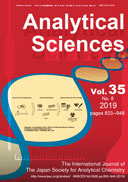
ANALYTICAL SCIENCES
Scope & Guideline
Exploring the Depths of Analytical Excellence
Introduction
Aims and Scopes
- Innovative Analytical Techniques:
The journal showcases research that develops and optimizes new analytical methods, including novel sensors, chromatography techniques, and spectroscopic methods, enhancing sensitivity, accuracy, and efficiency. - Environmental and Food Safety Analysis:
Research addressing the detection and quantification of pollutants, toxins, and contaminants in environmental samples and food products is a core focus, reflecting the journal's commitment to public health and safety. - Biochemical and Biomedical Applications:
The journal emphasizes studies that apply analytical techniques to biological and medical fields, including drug analysis, biomarker detection, and the development of biosensors for disease diagnostics. - Nanotechnology and Material Science:
Research exploring the applications of nanomaterials and advanced materials in analytical chemistry, particularly in sensor development and environmental remediation, is a prominent theme. - Machine Learning and Data Analysis:
The integration of machine learning and computational techniques in analytical chemistry for data interpretation, method optimization, and predictive modeling is increasingly featured.
Trending and Emerging
- Advanced Sensor Development:
There is a growing trend towards the creation of highly sensitive and selective sensors for various applications, including food safety, environmental monitoring, and medical diagnostics, often utilizing nanomaterials. - Integration of Artificial Intelligence:
The application of AI and machine learning techniques for data analysis, method optimization, and predictive modeling is becoming increasingly prominent, transforming traditional analytical practices. - Microfluidics and Lab-on-a-Chip Technology:
Research focusing on microfluidic devices and lab-on-a-chip systems is on the rise, emphasizing their potential for rapid, cost-effective, and efficient analytical processes. - Sustainable Analytical Practices:
The journal is highlighting research that emphasizes green chemistry principles and sustainable methods for sample preparation and analysis, reflecting a broader commitment to environmental responsibility. - Biomolecular Detection Technologies:
Emerging technologies for the detection of biomolecules, including nucleic acid and protein detection, are increasingly featured, supporting advancements in biomedical research and diagnostics.
Declining or Waning
- Traditional Chromatographic Techniques:
There has been a noticeable decrease in publications focused solely on traditional chromatography methods, as researchers increasingly explore innovative and hybrid techniques that offer enhanced performance. - Classic Spectroscopic Techniques:
Research centered on conventional spectroscopy methods, such as UV-Vis and IR spectroscopy, is appearing less frequently as newer, more advanced spectroscopic techniques gain prominence. - Generalized Environmental Monitoring:
While environmental analysis remains important, there is a decline in studies that focus broadly on environmental monitoring without specific applications or innovative approaches. - Basic Analytical Method Validation:
The emphasis on basic validation studies for established methods has diminished, as the journal shifts toward more complex and innovative validation approaches that incorporate new technologies. - Chemical Synthesis for Analytical Applications:
Research focused solely on chemical synthesis methods without direct analytical application is declining, as the journal prioritizes studies that demonstrate clear analytical relevance.
Similar Journals
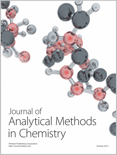
Journal of Analytical Methods in Chemistry
Empowering researchers with open access to cutting-edge findings.The Journal of Analytical Methods in Chemistry, published by HINDAWI LTD, stands as a premier platform dedicated to the dissemination of research in the vibrant field of analytical chemistry. With an ISSN of 2090-8865 and an E-ISSN of 2090-8873, this Open Access journal has been committed to providing unrestricted access to quality research since 1978, thereby fostering greater collaboration and innovation among researchers, professionals, and students globally. The journal showcases rigorous research insights spanning diverse categories, earning impressive Scopus rankings including Q2 in Chemical Engineering and Q3 in Analytical Chemistry for 2023, positioning itself effectively among respected peers. Its interdisciplinary approach also covers significant contributions in the realms of instrumentation and computer science applications, thus addressing contemporary challenges and advancements in analytical methodologies. By bridging theoretical underpinnings with practical applications, the Journal of Analytical Methods in Chemistry aims to catalyze knowledge exchange while enhancing the global discourse in analytical science.

ANALYTICAL AND BIOANALYTICAL CHEMISTRY
Pioneering Innovative Research in ChemistryANALYTICAL AND BIOANALYTICAL CHEMISTRY, published by SPRINGER HEIDELBERG, is a leading international journal that serves as a vital platform for innovative research in the fields of analytical and bioanalytical chemistry. With an impressive impact factor and ranking in the Q2 category for both Analytical Chemistry and Biochemistry, the journal highlights key advancements and methodologies that drive the discipline forward. Established in 1996 and continuing vigorously into 2024, it has gained significant recognition with Scopus rankings placing it in the 83rd and 78th percentiles within its categories, underscoring its impact and relevance. The journal's commitment to open access facilitates widespread dissemination of critical scientific knowledge, making it an essential resource for researchers, professionals, and students dedicated to exploring the complexities of chemical analysis. With its base in Heidelberg, Germany, ANALYTICAL AND BIOANALYTICAL CHEMISTRY continues to inspire and influence the global research community.
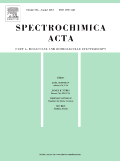
SPECTROCHIMICA ACTA PART A-MOLECULAR AND BIOMOLECULAR SPECTROSCOPY
Pioneering innovative techniques in spectroscopic research.SPECTROCHIMICA ACTA PART A-MOLECULAR AND BIOMOLECULAR SPECTROSCOPY, published by PERGAMON-ELSEVIER SCIENCE LTD, stands as a pivotal resource in the fields of molecular and biomolecular spectroscopy, providing a platform for researchers to disseminate significant findings from both analytical chemistry and molecular physics. With an impactful presence reflected in its Q2 rankings across several categories, including Analytical Chemistry and Spectroscopy, this journal aims to foster advancements in the understanding of molecular interactions through innovative spectroscopic techniques and methodologies. Despite not providing open access, its authoritative articles are crucial for professionals seeking to stay at the forefront of research and development in the discipline. The journal also showcases an impressive pedigree, ranked in the top tiers of Scopus indicators, including high percentiles in both Chemistry and Physics domains. With coverage expanding from 1995 to 2025, SPECTROCHIMICA ACTA PART A remains an essential reading for anyone dedicated to the evolution of spectroscopic science.
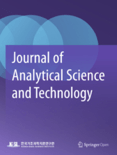
Journal of Analytical Science and Technology
Transforming Ideas into Impactful ApplicationsJournal of Analytical Science and Technology, published by SPRINGER INT PUBL AG, stands as a pioneering platform in the fields of Analytical Chemistry and Environmental Science. With an ISSN of 2093-3134 and E-ISSN 2093-3371, this Open Access journal, available since 2013, provides esteemed researchers with an opportunity to disseminate innovative research across a broad spectrum of applied science disciplines. The journal features a comprehensive range of studies addressing pivotal issues within Biochemistry, Genetics, Molecular Biology, Materials Science, and Physics, demonstrated by its impressive 2023 Scopus rankings in multiple categories, including Q2 in Chemistry and Environmental Science. Positioned within the UK and served from Switzerland, the journal actively encourages contributions that contribute to both practical applications and theoretical advancements, playing a vital role in fostering knowledge and collaboration among professionals, researchers, and students alike. Engage with the Journal of Analytical Science and Technology to contribute to and explore groundbreaking advancements within the analytical sciences.

LCGC EUROPE
Pioneering research and trends in laboratory practices.LCGC EUROPE is a prominent journal dedicated to the field of analytical chemistry, specifically highlighting the latest trends and innovations in chromatographic techniques. Published by MJH Life Sciences, this journal has served as a valuable resource for researchers, professionals, and students interested in the nuances of laboratory practices and the advancement of instrumentation. Although LCGC EUROPE ceased its coverage in Scopus from 2018, it has maintained a significant influence within the community, evidenced by its Scopus rank of 90/114 in Analytical Chemistry, placing it in the 21st percentile. With its inception dating back to 1996, the journal provided essential insights and peer-reviewed articles, fostering a rich understanding of chromatographic science. While the journal is not currently open access, it remains an integral part of the literature for anyone engaged in the analytical chemistry landscape, especially as it pertains to laboratory methodologies and innovations.

Analytical Science and Technology
Fostering collaboration and knowledge in diverse scientific fields.Analytical Science and Technology is a prominent journal dedicated to advancing the fields of analytical chemistry and technology, published by the Korean Society for Analytical Science. Based in South Korea, this journal serves as a vital platform for researchers, professionals, and students committed to exploring innovative analytical techniques and methodologies. Although it is classified under Q4 in various subject categories, including Agronomy and Crop Science, Environmental Chemistry, and Pharmacology, the journal aims to provide critical insights and contributions to the scientific community. With ISSN 1225-0163 and E-ISSN 2288-8985, it spans a converged timeline from 2019 to 2024. Despite its current standings in Scopus rankings, the journal is dedicated to improving its visibility and impact through rigorous peer review and high-quality publications, fostering knowledge sharing within its diverse academic fields. Researchers looking for a reliable outlet for their findings are encouraged to consider this journal as it continues to strive for excellence in analytical science.
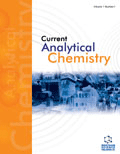
Current Analytical Chemistry
Unveiling innovations in chemical analysis.Current Analytical Chemistry is a pivotal journal in the field of analytical chemistry, published by Bentham Science Publishers Ltd. Established to bridge the gap between fundamental research and practical applications, this journal offers a platform for the dissemination of significant advancements and innovations from the realms of chemical analysis techniques and methodologies. With an impressive scope covering both theoretical and applied analyses, it has successfully secured a Q3 category ranking in the 2023 metrics of Analytical Chemistry, positioned at #75 out of 156 in the Scopus rankings. Researchers, professionals, and students can expect to engage with high-quality content that reflects the latest trends and issues within the discipline. Although it currently does not offer Open Access options, the journal continuously strives to maintain high editorial standards that contribute to its impactful presence in the academic community. The convergence of ideas from 2006 to 2024 promises to uphold its reputation as a reliable source for cutting-edge research in analytical chemistry.
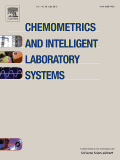
CHEMOMETRICS AND INTELLIGENT LABORATORY SYSTEMS
Pioneering the fusion of chemistry and computational intelligence.Chemometrics and Intelligent Laboratory Systems is a distinguished journal published by Elsevier, disseminating pivotal research and innovations at the intersection of analytical chemistry, computer science applications, and chemical engineering. With an impressive impact factor reflecting its scholarly influence, the journal aims to advance the development and implementation of chemometric methods, artificial intelligence, and intelligent systems in laboratory settings. Since its inception in 1986, the journal has consistently featured high-quality articles, currently positioned in the Q2 quartile across multiple relevant fields including Analytical Chemistry and Process Chemistry. Based in the Netherlands, the journal invites rigorous contributions that enhance the understanding and application of sophisticated data analysis techniques in scientific research. Although it currently does not offer open access options, the journal remains a vital resource for researchers and professionals dedicated to exploration and advancements in laboratory methodologies and analytical technologies.
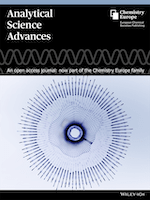
Analytical Science Advances
Empowering Discoveries in the Evolving World of Analytical ScienceAnalytical Science Advances is a dynamic journal published by WILEY, dedicated to the ever-evolving field of analytical chemistry. With an ISSN of 2628-5452, this open-access platform aims to disseminate high-quality research and insightful reviews that push the boundaries of analytical methodologies and instrumentation. Since its inception in 2020, the journal has gained traction, securing a commendable Q2 ranking in 2023 within its category, highlighting its significance in the scientific community. Currently positioned at Rank #68 out of 156 in Scopus' analytical chemistry category, it boasts a 56th percentile ranking, reflecting its contributions to advancing analytical techniques. Researchers, professionals, and students will find this journal an invaluable resource for keeping abreast of the latest developments, emerging technologies, and innovative approaches in analytical science, ensuring the journal's relevancy and influence in shaping future discoveries.
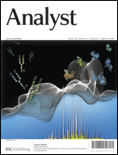
ANALYST
Illuminating Insights in Analytical and Environmental ChemistryANALYST, published by the Royal Society of Chemistry, stands as a prestigious journal in the fields of Analytical Chemistry, Biochemistry, Electrochemistry, Environmental Chemistry, and Spectroscopy. Esteemed for its rigorous peer-review process and influential contributions to the advancement of scientific knowledge, the journal has been a vital resource for researchers and professionals since its inception in 1876. With an impressive Scopus ranking that places it in the top quartile for several chemical disciplines, it specifically ranks #12 in Spectroscopy and #31 in Analytical Chemistry, reflecting its robustness and relevance in the analytical sciences. Though currently not an Open Access publication, ANALYST provides valuable insights and cutting-edge research that help drive innovation and discovery in various scientific realms. Researchers and students alike will benefit from its commitment to disseminating high-quality research that addresses contemporary challenges and promotes interdisciplinary collaboration.